

How to Plan an ESL Course: If you’ve never done it before. Welcome to 2018!
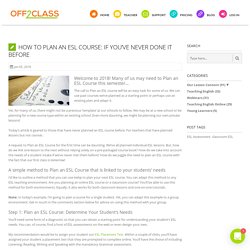
Many of us may need to Plan an ESL Course this semester… The call to Plan an ESL course will be an easy task for some of us. We can use past courses we’ve planned as a starting point or perhaps use an existing plan and adapt it. Yet, for many of us, there might not be a previous ‘template’ at our schools to follow. Save time on correcting assignments. The new mobile app we released last month came hand in hand with another major update. We introduced the challenge feature that lets you assign kahoots as homework, something that many of you, our community, were asking for. We’ve received a lot of encouraging feedback! For example, students on a recent school visit told us they often played challenges on the bus on their way home. Several teachers said learners even challenged their parents with homework kahoots.
And Mr. Homework challenges aren’t just fun and engaging. English Language Test, Intermediate level. At english-test.net you can not only test but also improve your English.
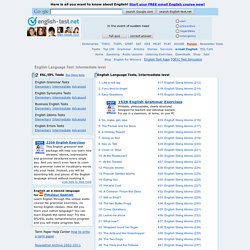
At the same time you can meet new people, exchange experiences on how to learn languages and a whole lot more. You will find hundreds of interactive grammar and vocabulary tests as well as other useful resources such as short stories, articles and interviews with business people.In addition, you can subscribe to a free email ESL course that provides useful information about the English language in a lighthearted way. Maybe, you want to make new friends and practise your communications skills?
In that case you should join our e-community by clicking on the friends link. You can also ask questions, get answers and support in our grammar forum. Controlled speaking. A selection of lesson plans that focus on controlled speaking.
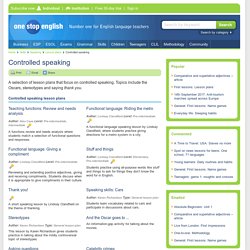
Topics include the Oscars, stereotypes and saying thank you. Teaching functions: Review and needs analysisA functions review and needs analysis where students match a selection of functional questions and responses.Functional language: Riding the metroA functional language speaking lesson by Lindsay Clandfield, where students practise giving directions for a metro system in a city.Functional language: Giving a complimentReviewing and extending positive adjectives, giving and receiving compliments. Online Quiz Creator: Play or Make a Quiz for Free! Home - CEFR exambot.com. Having fun with dialogues. Teachingenglish.org. Fluency activities for lower levels. Provide careful preparation – give lots of vocabulary practice and language practice beforehand Offer visual support – a grid to follow, a table to complete, a series of picture cards to hold will help students focus and remember language Half an hour is too long.
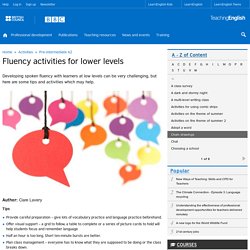
Short ten minute bursts are better. Plan class management – everyone has to know what they are supposed to be doing or the class breaks down into anarchy. Demonstrate with students. Run through with a pair of students. Don’t rely on verbal instructions. Motivating speaking activities for lower levels. Planning time has been shown to increase production in speaking tasks. Lower level learners often find it especially difficult to speak spontaneously, so these activities incorporate 'thinking time' during which learners can prepare for speaking by planning what they are going to say, and asking the teacher or using a dictionary to look up missing vocabulary. The following activities are relatively short, with minimal materials preparation time for the teacher. They are designed for use as a warmer or a filler in the middle or at the end of a class. 1. Definitions lists. Teachingenglish.org.
TED4ESL – Your place for ESL materials – ESL worksheets and lesson plans based on TED Talks. FluentU English Educator Blog. How does impeachment work? - Alex Gendler. Home - DreamreaderDreamreader. Role Play Archives – High Level Listening. Online Dictation. Listen A Minute: Easier English Listening and Lesson Plans. Learning.blogs.nytimes. SoundCloud – Listen to free music and podcasts. Online voice recorder. Share, Embed & Upload Audio with Clyp. Word on the Street. Starting Out.
Britain is GREAT. Let's Learn English - Level 1 - Articles. StoryCorps – Stories from people of all backgrounds and beliefs. On the same page. Authentic Listening Resource Pack. Cecilia Nobre ELT Blog. Thinking and Living English. By Kieran Donaghy. Lesson Plans Archives - Lesson Plans Digger. In this post, I am sharing an activity which helps students deal better with the Reading and use of English part 6 (cross-text multiple matching) activity in Cambridge Advanced exam.
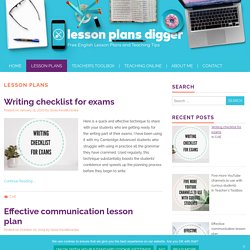
Continue Reading … This is a lesson I have recently tried with my C1 teenage group. It is based around the climate change solutions quiz by CNN. The activities include vocabulary brainstorming, mini group discussion and ranking, and a possible writing extension. You will need around 90 minutes for this class. Continue Reading … Downloadable lesson materials.
36 Questions to fall in love Level B1 upwards Skills: speaking and listening Language: Question forms (including slightly more complex B1 forms)
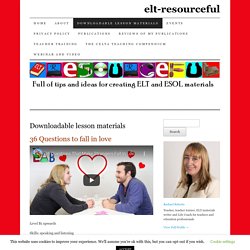
By Jamie Keddie Lessons - Lessonstream.org. Weekly topical news lessons. Elementary topical news lessons. Monthly topical news lessons at elementary level with worksheets for you to use in class.
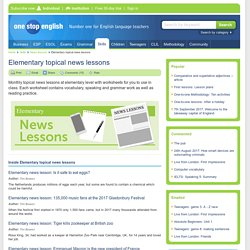
Each worksheet contains vocabulary, speaking and grammar work as well as reading practice. Elementary topical news lessons. News lessons. A NEW LANGUAGE MEANS ANOTHER VISION OF LIFE. Viral Videos for Higher Level ELT. Adaptive Learning in ELT. A few years ago, I wrote a couple of posts about the sorts of things that teachers can do in classrooms to encourage the use of vocabulary apps and to deepen the learning of the learning items.
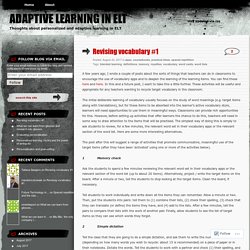
(60′) ‘The secret structure of great talks’ TED – Keep up with Bia. This lesson is part of a Business project I have developed to attend the Intermediate level (B1 CEFR) at the Institution I work for.

The objective of this project is to provide a real-life environment where students will be able to enrich their business lexical sets on the topic chosen. In this lesson, I’m using Nancy Duarte’s TED talk on “The secret structure of great talks” in which she is able to share her views and findings on the comparison made between King’s “I have a dream” speech and Job’s “2007 iPhone launch” speech. She actually shows us that there is a clear and objective structure to follow, and that is exactly the objective of this lesson.
FCE - formal letter or email. Paper 2 Part 1 - Formal letter or email Formal letters may be written to an individual or to an organisation.
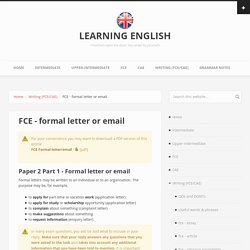
The purpose may be, for example, to apply for part-time or vacation work (application letter)to apply for study or scholarship opportunity (application letter)to complain about something (complaint letter)to make suggestions about something to request information (enquiry letter) In many exam questions, you will be told what to include in your reply. Make sure that your reply answers any questions that you were asked in the task and takes into account any additional information that you have been told to mention.
How to write formal letters. FCE - informal letter or email. Paper 2 Part 2 - Informal letter or email An informal letter or email is usually between people who know each other fairly well. In addition to giving news, they are often used to request information, congratulate people, give advice and ask questions. There are a lot of similarities between informal letters and conversation. Informal letters ask a lot of questions, show interest and enthusiasm, and imagine a lot of shared information. In many exam questions, you will be told what to include in your reply. 55 verbos em inglês pouco conhecidos, mas muito úteis. Observe The Evidence For Evolution On Your Own Body.
Examples of how to use the 8 parts of speech in English grammar - learn English,english,grammar,parts,speech. 6 quick games to play at the end of class. With a couple of minutes left until the end of the lesson, your class might descend into chaos: L1 flying, frantic packing, texting, or worse, students actually queuing in front of the door waiting for you to let them out. I am talking about both younger and older students here. In this post, I am presenting 6 quick games that will help you finish on a good note and keep your students engaged until the very end. I have tried these games with children, teenagers, and adults, depending on the situation.
They are quick, easily adaptable to various topics and levels, and most importantly, require no preparation (other than pasting a link in your browser). You will find 3 online and 3 offline ideas below. Quick online games 1. Select the option LETTERS. 2. TED talks for autonomous listening: ten activities. The first week of the Electronic Village Online is in full swing!
I’m co-moderating the session on teaching listening, and this week, under the guidance of Lizzie Pinard, we’ve started out with the topic of encouraging learner autonomy. My favourite activities for first lessons with adults. In this post, I am describing my three favourite activities for first lessons with adult learners. I have been mostly using them during my individual classes. Sarahah – a conversation lesson – BA -VISUAL LESSON PLANS. Have you heard of the newest sensation among teenagers?